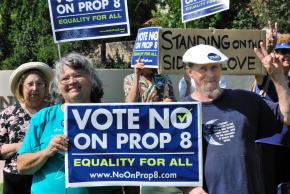What’s at stake on Prop 8?
reports on the battle over a ballot measure in California that would ban same-sex marriages.
SUPPORTERS OF equal marriage rights are looking to California, as voters prepare to decide on Proposition 8, a ballot measure that would ban recently legalized same-sex marriages.
Early polls indicated the antigay measure would be easily defeated. But after right-wing forces poured money into the campaign, more recent surveys show a close vote--raising deep concern, in particular among thousands of same-sex couples who have been married since June 16, when the state Supreme Court overturned a previous ban, making same-sex marriage legal in California.
Over the years, polls have shown a steady growth in support for the right of gays and lesbians to marry. When the Field Poll first asked in 1977 about support for same-sex marriage, 28 percent responded favorably. Earlier this year, 54 percent of Californians said they supported gay marriage in a Los Angeles Times poll.
With its 4-3 decision, the Republican-dominated court became the first state supreme court to identify sexual orientation as a protected class. Now, that victory is in jeopardy.

What happened to shift some voters on Prop 8?
The Mormon Church and Knights of Columbus have pumped millions of dollars into the campaign, far outspending opponents of the measure. The Yes on 8 campaign rolled out its first ads in late September, featuring San Francisco Mayor Gavin Newsom declaring that marriage equality is coming "whether you like it or not!" Conservative churches across the country have also taken up the cry.
Once the effect of the right's campaign became clear, marriage equality activists turned up their effort with fundraisers, phone-banking and rallies. With sentiment against Prop 8 gaining steam again, the Yes on 8 bigots last week sent threats to companies that donated against the proposition, demanding that they donate an equal amount in support of Prop 8, or be "outed" for supporting marriage equality.
Yes on 8 forces are playing on homophobic ideas that still hold some sway for some people--that learning in school that gay relationships are valid will make their kids gay; that if gays can get married, anything goes, and you'll soon be able to marry your cat; that legislating gay rights will deny the right to hold homophobic beliefs; that allowing gays to get married will further erode the American family.
In reality, of course, the biggest threat to the American family is the global economic meltdown, not gay marriage. Working families have been suffering the stress of lower wages and longer work hours for years. Worsening unemployment, higher gas and food prices, and the epidemic of home foreclosures have drastically worsened these problems.
THE NO on 8 campaign hasn't taken on these arguments directly, but instead based its message on results from focus groups. So the ads against Prop 8 focus primarily on people's strong discomfort with having civil rights taken away from a group of people.
If Prop 8 passes, it would be the first time that a denial of civil rights is written into a state's constitution anywhere. Public opinion is pretty solid when it comes to the idea that we should all, generally speaking, be treated fairly.
But because public opinion is still shaky, though trending in favor, on gay rights, the creators of the ads against Prop 8 don't discuss the issue explicitly. They don't, in fact, feature actual gay people or weddings.
Gay activists have expressed frustration with this, arguing that the message against Prop 8 has been too tame. They challenged No on 8 organizers about why their ads don't feature either celebrities who support same-sex marriage, like Brad Pitt, or politicians who oppose the referendum, like most California Democrats. The newest No on 8 ad now features State Superintendent of Schools Jack O'Connell.
For his part, Barack Obama has come out against Prop 8. The electoral debate around gay marriage this year isn't as intolerant and hateful as it was four years ago, when it was the cutting-edge issue for Republicans. This says something good about where the political debate over gay rights is at today.
But it doesn't help that Obama and his running mate Joe Biden voice opposition to gay marriage. The fact is that there are only two sides to the question of gay rights--either for same-sex couples having equal rights, or against. When a presidential candidate states that he doesn't support gay marriage, he gives ammunition to the antigay bigots.
We should ask what has brought public opinion this far in support of same-sex marriage.
The modern gay rights movement started with a riot almost 40 years ago at a New York City gay bar. The gay rights movement of the 1970s broadly raised the expectation of lesbian, gay, bisexual and transgender (LGBT) people that we should have the same rights as straight people.
The movement has had its setbacks--like when activists let supposed "ally" Bill Clinton sign the Defense of the Marriage Act without a fight, for example. But steadily, LGBT people and our real allies have demanded and won our right to teach in public schools, to not be discriminated against on the job, to have our unions and churches support us, to adopt children, to have domestic partner rights, and (in the last several years) to marry. We have created a public environment that makes it easier to live our lives openly.
All of this has created more positive visibility for LGBT people, with new generations growing up and knowing that it's okay to be gay.
If we are going to defeat attempts from the right to take away our rights, we will need to be outspoken and uncompromising in our opposition to antigay attacks, wherever they happen. That's how we are going to defeat Prop 8 and stop the right from turning back the clock on our right to equal marriage.


